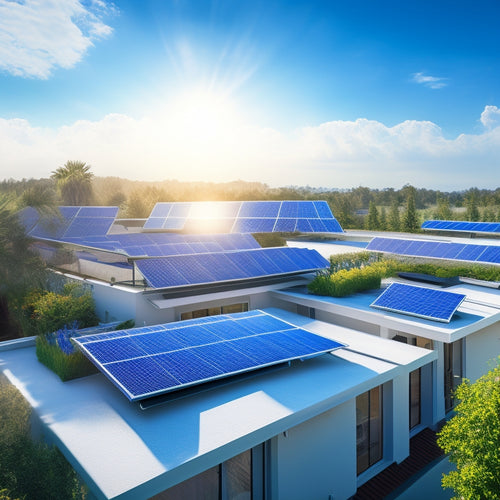
What Makes a Solar Panel Set Good for Your Home
Share
When choosing a solar panel set for your home, you'll want to take into account several key factors. High-quality panels with high-efficiency ratings and durable materials are vital for maximizing energy output and lifespan. Durability and weather resistance are also important, as they minimize maintenance and reduce electronic waste. Additionally, verify the system is compatible with your existing electrical infrastructure and has efficient energy storage options. Finally, look for a system with a professional installation, hassle-free maintenance, and thorough warranties. By evaluating these factors, you'll be well on your way to utilizing the full benefits of solar energy, and there's even more to uncover about optimizing your system's performance.
Key Takeaways
- High-quality solar panels with high-efficiency ratings, durable materials, and strong warranties ensure long-term benefits and reduced maintenance.
- Aesthetic appeal, durability, and weather resistance are crucial factors to consider when selecting a solar panel set for your home.
- Energy efficiency and output are maximized through ideal placement, angle, and configuration, reducing energy bills and carbon footprint.
- Compatibility with home systems, including energy storage options and inverters, is essential for efficient energy distribution and reliability.
- Professional installation, maintenance ease, and reliable support options are vital for optimal system performance and long-term satisfaction.
High-Quality Solar Panels Matter
When evaluating solar panels for your home, the quality of the panels themselves is vital. You'll want to take into account factors beyond just the initial cost, as high-quality panels can provide significant long-term benefits.
Aesthetic appeal is one aspect to ponder, as solar panels will be a visible feature of your home's exterior. Look for panels with a sleek, modern design that will complement your home's design.
Cost considerations are also important. While high-quality panels may be more expensive upfront, they can provide greater energy efficiency and a longer lifespan, ultimately saving you money in the long run.
Additionally, high-efficiency panels can generate more power per hour of sunlight, allowing you to maximize your energy production. When selecting solar panels, prioritize those with high-efficiency ratings, durable materials, and a strong warranty.
Durability and Weather Resistance
Because solar panels are installed outdoors, they're exposed to various environmental elements that can affect their performance and lifespan. You want to guarantee that your solar panel set can withstand harsh weather conditions, such as heavy rain, hail, and extreme temperatures.
A durable solar panel set is essential to minimize maintenance and guarantee peak energy production.
Material quality plays a significant role in the durability and weather resistance of your solar panels. Look for high-quality materials that can withstand environmental stressors. For instance, tempered glass or high-strength aluminum frames can provide added protection against physical damage.
Additionally, a waterproof coating can prevent water intrusion and corrosion.
The environmental impact of your solar panel set should also be considered. A durable solar panel set reduces the need for frequent replacements, which can lead to electronic waste and contribute to environmental pollution.
Energy Efficiency and Output
Two key factors to evaluate when selecting solar panels for your home are their energy efficiency and output. These metrics directly impact how much electricity you can generate from your solar panel system.
Solar panel efficiency measures how well a panel converts sunlight into electricity. Look for panels with high efficiency ratings (usually above 20%) to maximize energy production.
Energy output enhancement is also essential, as it guarantees your system produces the most power possible. This is achieved through ideal panel placement, angle, and configuration.
When evaluating solar panels, consider the maximum power output (measured in watts) and the temperature coefficient, which affects performance in hot climates.
A high-efficiency panel with ideal energy output can greatly reduce your energy bills and carbon footprint. By prioritizing energy efficiency and output, you'll be able to generate more power from your solar panel system and reap the maximum benefits of renewable energy.
Compatibility With Home Systems
You'll need to evaluate how your solar panel system integrates with your home's existing electrical infrastructure, including energy storage options and inverter compatibility.
System integration needs involve aligning your solar panel system with your home's energy requirements, guaranteeing efficient energy distribution.
Additionally, you'll want to investigate energy storage options, such as batteries, and address potential inverter compatibility issues to assure seamless system operation.
System Integration Needs
In conjunction with your existing electrical infrastructure, solar panels must be integrated seamlessly to guarantee a harmonious and efficient energy flow. This integration is vital to make certain that your solar panel system works in tandem with your home's electrical system. A well-designed system integration makes certain that your solar panels generate power efficiently and feed it into your home's electrical grid, reducing your reliance on the utility company.
| System Component | Integration Requirement |
| Inverters | Convert DC power from solar panels to AC power for home use |
| Mounting System | Securely fasten solar panels to your roof, guaranteeing durability and weather resistance |
| Electrical Panel | Connect solar panel system to your home's electrical panel, allowing for efficient power distribution |
| Monitoring System | Track energy production, consumption, and system performance in real-time |
A thorough system design and power management strategy are essential to guarantee a seamless integration. This involves evaluating your home's energy requirements, designing a system that meets those needs, and selecting components that work together harmoniously. By integrating your solar panel system correctly, you can enjoy a reliable and efficient source of renewable energy.
Energy Storage Options
Energy independence relies heavily on a dependable energy storage system that seamlessly integrates with your home's electrical infrastructure. When choosing a solar panel set, you need to take into account the energy storage options that come with it. This is vital because it directly affects the efficiency and reliability of your solar power system.
You'll want to look for systems that offer versatile battery types, such as lead-acid, lithium-ion, or saltwater batteries, to suit your specific energy needs.
Storage capacity is another significant factor to take into account. You'll need to determine how much energy you need to store during the day for use at night or during power outages. A system with adjustable storage capacity or one that allows you to add more batteries as needed will provide you with the flexibility you require.
Additionally, reflect on the system's compatibility with your home's electrical infrastructure, including the type of electrical panel and wiring. A well-designed energy storage system will guarantee that you have a steady supply of power when you need it most.
Inverter Compatibility Issues
Three key components - solar panels, energy storage, and inverters - form the backbone of a solar power system. When choosing a solar panel set for your home, it's crucial to evaluate inverter compatibility issues to guarantee a seamless integration with your home's electrical system.
Inverters convert DC power from solar panels to AC power for your home. You'll need to select an inverter that's compatible with your solar panel system and energy storage options. There are three main inverter types: string inverters, microinverters, and power optimizers.
| Inverter Type | Brand Options | Compatibility |
|---|---|---|
| String Inverters | Fronius, SMA | Suitable for simple solar panel systems |
| Microinverters | Enphase, SunPower | Ideal for complex solar panel systems or those with shading issues |
| Power Optimizers | SolarEdge, Tigo | Compatible with energy storage systems and monitoring capabilities |
When selecting an inverter, research inverter brands and their compatibility with your solar panel system and energy storage options. Confirm the inverter you choose is compatible with your home's electrical system to maximize energy production and efficiency.
Installation and Maintenance Ease
Your investment in solar panels deserves a hassle-free installation and maintenance experience. You want to confirm that your system is installed correctly to maximize energy output and minimize potential issues. That's why professional installation is essential.
A reputable installer will assess your roof's condition, verify proper panel alignment, and connect the system to your electrical grid. This attention to detail guarantees a safe and efficient energy production.
Regular inspections are also important to maintain your solar panel's performance. You should schedule annual checks to identify and address any potential problems before they escalate.
During these inspections, your installer will clean the panels, inspect the electrical connections, and verify the system's overall performance. This proactive approach prevents energy loss, reduces repair costs, and prolongs your system's lifespan.
Warranty and Support Options
A well-installed and well-maintained solar panel system is just the beginning. You want to guarantee that your investment is protected with a thorough warranty and reliable support options.
When evaluating solar panel sets, you should pay attention to the warranty terms. Look for manufacturers that offer a minimum 25-year warranty on the panels and at least a 10-year warranty on the inverters. This will give you peace of mind knowing that you're covered in case any components fail or degrade over time.
In addition to warranty terms, you should also consider the support channels offered by the manufacturer. Do they've a dedicated customer service team that can assist with troubleshooting and maintenance? Are they available 24/7 or only during business hours?
Do they offer online resources, such as FAQs and tutorials, to help you resolve issues on your own? Having a dependable support system in place can make all the difference in getting the most out of your solar panel system.
Frequently Asked Questions
Can I Install Solar Panels on a Shaded Roof?
As you gaze up at your shaded roof, you wonder if solar panels can still utilize the sun's power. Unfortunately, shaded areas greatly reduce solar efficiency, making it essential to assess your roof's sunlight exposure before installation.
Will Solar Panels Increase My Property Value?
You'll enhance your property value with solar panels, as they're seen as a desirable, modern feature, and you'll reap energy savings, making your home more attractive to potential buyers and increasing its resale value.
Do Solar Panels Work During a Power Outage?
You're literally left in the dark during a power outage, but with solar panels, you're not entirely off the grid. While they don't produce power during an outage, a battery backup system guarantees you maintain some grid independence, utilizing solar panel efficiency when the sun rises again.
Can I Install Solar Panels Myself to Save Money?
You're considering a DIY installation to save money, but weigh the cost considerations: while it may cut upfront costs, a self-install can lead to safety risks, reduced efficiency, and potential voiding of manufacturer warranties.
Are Solar Panels Recyclable at the End of Their Life?
As you consider solar panels, you're likely thinking of the environmental benefits, but what about the end of their life? You'll be relieved to know that solar panels are recyclable, with recycling processes recovering up to 95% of materials, making solar panel disposal a sustainable solution.
Related Posts
-

Essential Accessories for Heavy Riders of E-Bikes
As a heavy rider of an e-bike, you need specialized gear that caters to your unique needs. Start with safety essentia...
-

Top 10 Tips for Buying Car Accessories Online
When purchasing car accessories online, you should take proactive steps to avoid low-quality or incompatible products...
-

Best Solar Panel Options for Maximum Energy Savings
You can maximize your energy savings with solar panels that boast efficiency ratings above 20%, paired with extensive...


